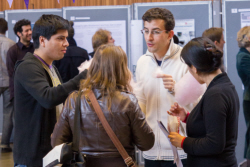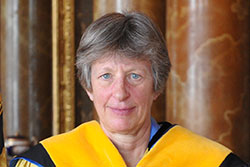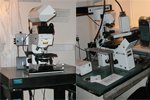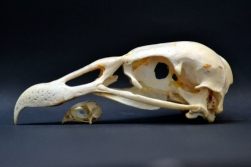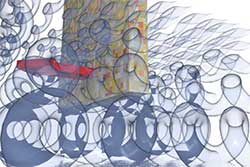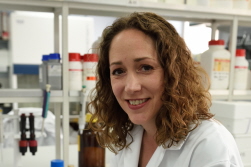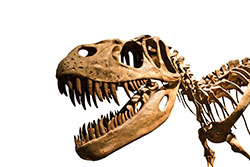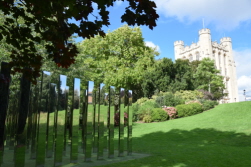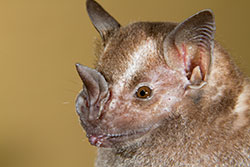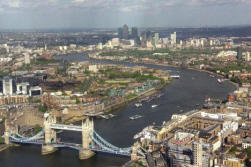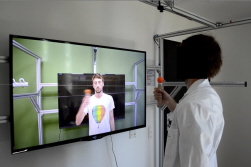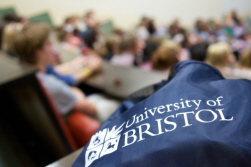Meet the future: businesses invited to research showcase
Business leaders from across the region are being invited to explore the work of more than 100 University of Bristol postgraduate researchers at a special showcase.
Business leaders from across the region are being invited to explore the work of more than 100 University of Bristol postgraduate researchers at a special showcase.
Katharine Cashman, Professor of Volcanology in the School of Earth Sciences, and Professor David Lodge, Visiting Fellow in the School of Physiology and Pharmacology, have achieved the rare distinction of being elected Fellows of the world’s most eminent and oldest scientific academy in continuous existence: the Royal Society.
How birds’ beaks evolved characteristic shapes to eat different food is a classic example of evolution by natural selection.
Over 600 students from schools and colleges across the Bristol area have ‘graduated’ from a unique scheme which gives them an insight into studying at university.
Dr Helen Piper, Senior Lecturer in Television Studies, at the University of Bristol, has won the award for Best Monograph at the 2016 British Association of Film, Television and Screen Studies (BAFTSS).
Sandy Benefield, a student in the Department of English, died in April after a long illness. Tom Sperlinger, one of her tutors, remembers her.
Atmospheric carbon dioxide concentration was the major driver behind the global climatic shifts that occurred 53 to 34 million years ago, according to new research led by the University of Southampton, the University of Bristol and Cardiff University.
A ground-breaking technique capable of measuring the extremely weak forces exerted by light – forces smaller than one piconewton – has been developed by scientists at the University of Bristol.
Researchers from the University of Bristol have begun a trial to find out how well a training and support package for teachers works in recognising and combatting mental health problems.
A University of Bristol spin-out company working to advance the treatment and prevention of bacterial infection by developing a solution to improve the efficacy of chlorhexidine-based products has received major investment to progress the technology.
The University of Bristol Theatre Collection is making its contribution to the Shakespeare 400 celebrations, marking the 400th anniversary of the playwright’s death on 23 April, with two new exhibitions, both of which opened this week.
A group of determined cyclists have pushed and pedalled themselves to the limit by cycling 392 miles in six days, raising more than £4,800 for charity in the process.
The leaves of virus-infected plants reflect light differently to attract the attention of disease-spreading greenfly, new research suggests.
The school a girl attends can affect her chance of being diagnosed with an eating disorder, according to research carried out by a joint UK-Swedish team, and published today in the International Journal of Epidemiology.
Three members of Bristol’s High Performance Networks Group have won the 2016 Charles Kao Award from the Institute of Electrical and Electronics Engineers (IEEE) Communications Society.
The University’s Academic Staff Development (ASD) team held its inaugural Academic Practice Symposium, ‘Going Public’, on 13 April 2016 at the Orangery, Goldney Hall.
The memory and influence of the playwright Kevin Elyot is to be celebrated by the University of Bristol Theatre Collection, through an award in his name.
Dr Kate Hendry, Royal Society Research Fellow in the School of Earth Sciences, has joined an EU-funded project to examine the ecology and diversity of deep-sea sponge ecosystems in the North Atlantic.
Two engineers from the University of Bristol’s Communication Systems and Networks (CSN) group, who are leaders in the field of 5th generation (5G) wireless networks, have been invited to discuss the future of wireless communications in Brussels and Brooklyn (US) this week [19 to 22 April].
Dinosaurs were already in an evolutionary decline tens of millions of years before the meteorite impact that finally finished them off, new research has found.
Students graduating from two international courses at the City University of Hong Kong will be joined for their graduation today by a delegation from the University of Bristol.
Sarah Marshall, an Events Officer in the University’s Development and Alumni Relations Office, will be taking part in an epic fitness challenge on 7 and 8 May 2016 to raise vital funds for local charity, the Capella Foundation.
Ninety-seven per cent of climate scientists agree global warming is caused by people, a new study by an international team of researchers, including Professor Stephan Lewandowsky of the University of Bristol, has confirmed.
A rare glimpse into the city’s horticultural history and beautiful biodiversity is being offered through a series of guided tours and events, launched today.
The biggest library of bat sounds has been compiled by an international team of scientists, including Professor Gareth Jones of the University of Bristol. The reference call library will allow scientists to accurately and quickly identify and differentiate between bat species.
Results of research to discover how communities are changing will be presented at an event in London today.
For the first time, an international group of scientists, has come up with a way to estimate on a large scale how phosphorus flows through an environment over many decades. The research team, including the University of Bristol, found the UK is using less fertilizer to grow food and that both historically and currently, it is a world leader in modern wastewater treatment.
Declan Anderson, Emeritus Professor of Oral Biology at Bristol, died at the age of 95 on Easter Day, 27 March. His friend and colleague, Professor Bruce Matthews, offers a tribute.
City life in Bristol is up there with the best in Britain, according to students who have voted for the University of Bristol in the latest Whatuni Student Choice Awards 2016.
Stress is a major burden in many people’s lives affecting their health and wellbeing. New research led by the University of Bristol has found that genes in the brain that play a crucial role in behavioural adaptation to stressful challenges are controlled by epigenetic mechanisms.
A team of researchers at the University of Bristol is embarking on a study to investigate the link between high blood pressure and dementia thanks to a £388,000 funding boost from the charity Alzheimer’s Research UK.
Bedminster will be hosting its first pop-up museum from Friday [15 April], inviting the public to take a stroll down memory lane.
A collaborative research team has found humanoid robotics and computer avatars could help rehabilitate people suffering from social disorders such as schizophrenia or social phobia. It is thanks to the theory of similarity, which suggests that it is easier to interact socially with someone who looks, behaves or moves like us.
The former Habitat store on Clifton Triangle will start its new lease of life today [11 April] when its transformation into a student centre, public reception and café is unveiled by the University of Bristol.
Today sees the launch of two films, coproduced by local digital media company, Calling the Shots with academics from the University of Bristol, presenting the culmination of Know Your Bristol on the Move, a collaborative project between the University, Bristol City Council and 12 (and counting) Bristol community groups.
Three short films, co-produced with local digital media company, Calling the Shots, outline the practicalities and challenges surrounding a collaborative project between the University of Bristol and local partners to explore, research and map the city’s history, heritage and culture.
New research from the Personal Finance Research Centre at the University of Bristol has found the majority of people are unlikely to switch their current account, despite it being easier than ever to do.
The most inspiring lecturers at the University of Bristol, as voted by students, will be sharing their wisdom with the public in a series of free lunchtime and evening lectures.
Factors that influence when boys go through puberty could affect a man’s future risk of developing prostate cancer, a large study funded by World Cancer Research Fund has found.
